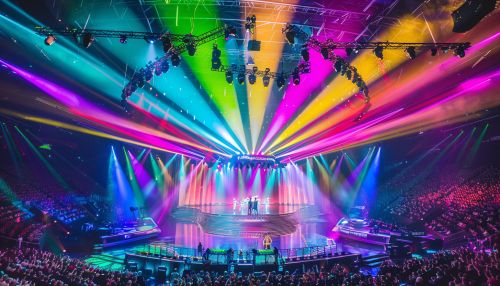Eurovision Song Contest history: Difference between revisions
(Created page with "== Introduction == The Eurovision Song Contest is an annual international song competition held primarily among the member countries of the European Broadcasting Union (EBU). Since its inception in 1956, the contest has grown to become one of the longest-running and most-watched non-sporting events in the world. This article delves into the history of the Eurovision Song Contest, exploring its origins, evolution, and cultural impact. == Origins and Early Years (195...") |
No edit summary |
||
| Line 37: | Line 37: | ||
The Eurovision Song Contest has come a long way since its humble beginnings in 1956. It has grown into a global phenomenon, showcasing a diverse array of musical talents and promoting cultural exchange. The contest's history is a testament to its enduring appeal and its ability to adapt to changing times. As it continues to evolve, the Eurovision Song Contest remains a unique and cherished event in the world of entertainment. | The Eurovision Song Contest has come a long way since its humble beginnings in 1956. It has grown into a global phenomenon, showcasing a diverse array of musical talents and promoting cultural exchange. The contest's history is a testament to its enduring appeal and its ability to adapt to changing times. As it continues to evolve, the Eurovision Song Contest remains a unique and cherished event in the world of entertainment. | ||
[[Image:Detail-91467.jpg|thumb|center|Eurovision Song Contest stage with colorful lighting and large audience.|class=only_on_mobile]] | |||
[[Image:Detail-91468.jpg|thumb|center|Eurovision Song Contest stage with colorful lighting and large audience.|class=only_on_desktop]] | |||
== See Also == | == See Also == | ||
Latest revision as of 03:21, 21 June 2024
Introduction
The Eurovision Song Contest is an annual international song competition held primarily among the member countries of the European Broadcasting Union (EBU). Since its inception in 1956, the contest has grown to become one of the longest-running and most-watched non-sporting events in the world. This article delves into the history of the Eurovision Song Contest, exploring its origins, evolution, and cultural impact.
Origins and Early Years (1956-1969)
The Eurovision Song Contest was conceived during a meeting of the EBU in Monaco in 1955. Inspired by the Sanremo Music Festival in Italy, the aim was to bring together European countries through a light entertainment program. The first contest was held on May 24, 1956, in Lugano, Switzerland, with seven participating countries: Belgium, France, Germany, Italy, Luxembourg, the Netherlands, and Switzerland.
The early years of the contest were characterized by simple stage setups and live orchestral accompaniments. The first winner was Lys Assia from Switzerland with the song "Refrain." The contest quickly gained popularity, and by the late 1960s, it had expanded to include over a dozen countries.
Expansion and Technological Advancements (1970-1989)
The 1970s and 1980s saw significant changes in the Eurovision Song Contest. The introduction of color television in 1968 and satellite broadcasting in the 1970s allowed the contest to reach a wider audience. The number of participating countries continued to grow, with countries from Eastern Europe and the Mediterranean joining the competition.
One of the most notable winners during this period was the Swedish group ABBA, who won in 1974 with their song "Waterloo." This victory catapulted ABBA to international fame and demonstrated the contest's potential as a launching pad for successful music careers.
Technological advancements also influenced the contest's production values. The use of pre-recorded backing tracks became common, and elaborate stage designs and lighting effects were introduced. The voting system evolved as well, with the introduction of the "douze points" system in 1975, which awarded points from 1 to 12 to the top ten songs from each country's jury.
The Modern Era and Globalization (1990-2009)
The fall of the Berlin Wall and the subsequent political changes in Eastern Europe had a profound impact on the Eurovision Song Contest. The 1990s saw a surge in the number of participating countries, with many former Soviet states and Yugoslav republics joining the competition. This period also marked the beginning of the contest's globalization, with countries outside of Europe, such as Israel and Turkey, achieving notable success.
In 1998, Dana International from Israel won the contest with her song "Diva," becoming the first openly transgender winner. This victory was a significant moment in the contest's history, highlighting its role in promoting diversity and inclusion.
The introduction of televoting in 1997 allowed viewers to participate directly in the voting process, further increasing the contest's popularity. The early 2000s saw the introduction of semi-finals to accommodate the growing number of participants, ensuring that all countries had a fair chance to compete in the grand final.
Recent Developments and Cultural Impact (2010-Present)
The Eurovision Song Contest has continued to evolve in the 21st century. The contest's format has been refined, with the introduction of two semi-finals in 2008 to manage the increasing number of entries. The use of social media and online streaming has expanded the contest's reach, attracting millions of viewers worldwide.
One of the most memorable winners of the recent era is Conchita Wurst from Austria, who won in 2014 with her song "Rise Like a Phoenix." Conchita's victory was celebrated as a triumph for LGBTQ+ rights and further cemented the contest's reputation as a platform for promoting social change.
The contest has also seen increased participation from countries outside of Europe, with Australia being invited to compete in 2015 as a special guest. This move was a testament to the contest's global appeal and its ability to bring together diverse cultures through music.
Conclusion
The Eurovision Song Contest has come a long way since its humble beginnings in 1956. It has grown into a global phenomenon, showcasing a diverse array of musical talents and promoting cultural exchange. The contest's history is a testament to its enduring appeal and its ability to adapt to changing times. As it continues to evolve, the Eurovision Song Contest remains a unique and cherished event in the world of entertainment.


